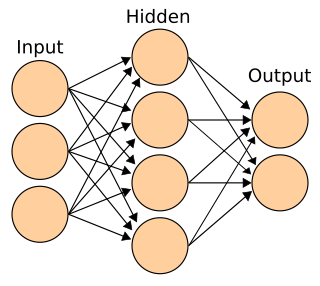Artificial consciousness (AC), also known as machine consciousness (MC) or synthetic consciousness, is a field related to artificial intelligence and cognitive robotics. The aim of the theory of artificial consciousness is to "Define that which would have to be synthesized were consciousness to be found in an engineered artifact".
Vladimir Naumovich Vapnik is one of the main developers of the Vapnik–Chervonenkis theory of statistical learning, and the co-inventor of the support-vector machine method, and support-vector clustering algorithm.

Connectionism refers to both an approach in the field of cognitive science that hopes to explain mental phenomena using artificial neural networks (ANN) and to a wide range of techniques and algorithms using ANNs in the context of artificial intelligence to build more intelligent machines. Connectionism presents a cognitive theory based on simultaneously occurring, distributed signal activity via connections that can be represented numerically, where learning occurs by modifying connection strengths based on experience.

James Lloyd "Jay" McClelland, FBA is the Lucie Stern Professor at Stanford University, where he was formerly the chair of the Psychology Department. He is best known for his work on statistical learning and Parallel Distributed Processing, applying connectionist models to explain cognitive phenomena such as spoken word recognition and visual word recognition. McClelland is to a large extent responsible for the large increase in scientific interest in connectionism in the 1980s.

Stephen Grossberg is a cognitive scientist, theoretical and computational psychologist, neuroscientist, mathematician, biomedical engineer, and neuromorphic technologist. He is the Wang Professor of Cognitive and Neural Systems and a Professor Emeritus of Mathematics & Statistics, Psychological & Brain Sciences, and Biomedical Engineering at Boston University.
John Robert Anderson is a Canadian-born American psychologist. He is currently professor of Psychology and Computer Science at Carnegie Mellon University.

Michael I. Posner is an American psychologist who is a researcher in the field of attention, and the editor of numerous cognitive and neuroscience compilations. He is emeritus professor of psychology at the University of Oregon, and an adjunct professor at the Weill Medical College in New York. A Review of General Psychology survey, published in 2002, ranked Posner as the 56th most cited psychologist of the 20th century.

Stanislas Dehaene is a French author and cognitive neuroscientist whose research centers on a number of topics, including numerical cognition, the neural basis of reading and the neural correlates of consciousness. As of 2017, he is a professor at the Collège de France and, since 1989, the director of INSERM Unit 562, "Cognitive Neuroimaging".
Ron Sun is a cognitive scientist who made significant contributions to computational psychology and other areas of cognitive science and artificial intelligence. He is currently professor of cognitive sciences at Rensselaer Polytechnic Institute, and formerly the James C. Dowell Professor of Engineering and Professor of Computer Science at University of Missouri. He received his Ph.D. in 1992 from Brandeis University.
Gerhard Werner (1921–2012) was a medical doctor and scholar active in research covering areas of pharmacology, psychiatry, cognitive neuroscience, especially neurodynamics, artificial intelligence, and complexity theory. During his career, and continuing after his retirement in 1989, he published just over a hundred scientific papers and held administrative posts in government, academic and corporate institutions.

Helen J. Neville was a Canadian psychologist and neuroscientist known internationally for her research in the field of human brain development.
Robert Kozma is First Tennessee University Professor of Mathematics at the University of Memphis.
Richard Graham Michael Morris,, is a British neuroscientist. He is known for developing the Morris water navigation task, for proposing the concept of synaptic tagging, and for his work on the function of the hippocampus.
William "Bill" Gehring is a psychologist, and in 2014 is the Arthur F. Thurnau Professor of Psychology at the University of Michigan in Ann Arbor, Michigan. He researches Event Related Potentials and is one of the discoverers of the Error Related Negativity. He has made contributions to the field of cognitive neuroscience through his studies on the electrophysiological markers of obsessive-compulsive disorder.
The following outline is provided as an overview of and topical guide to brain mapping:
Neuromanagement uses cognitive neuroscience, among other life science fields, and technology to analyze economic and managerial issues. It focuses on exploring human brain activities and mental processes when people are faced with typical problems of economics and management. This research provides insight into human decision-making and other general social behavior. The main research areas include decision neuroscience, neuroeconomics, neuromarketing, neuro-industrial engineering, and neuro-information systems. Neuromanagement was first proposed in 2006 by Professor Qingguo Ma, the director of Neuromanagement Laboratory of Zhejiang University.

The Princeton Neuroscience Institute (PNI) is a center for neuroscience research at Princeton University. Founded in the spring of 2004, the PNI serves as a "stimulus for teaching and research in neuroscience and related fields" and "places particular emphasis on the close connection between theory, modeling, and experimentation using the most advanced technologies." It often partners with Princeton University's departments of Psychology and Molecular Biology.
Cyma Kathryn Van Petten is an American cognitive neuroscientist known for electrophysiological studies of language, memory, and cognition. She is Professor of Psychology at the State University of New York at Binghamton where she directs the Event-Related Potential Lab. Van Petten was recipient of the Early Career Award from the Society for Psychophysiological Research in 1994.
Stephen E. Nadeau is an American behavioral neurologist, researcher and academician. He is a Professor of Neurology at the University of Florida College of Medicine. He is also the Associate Chief of Staff for Research at the Malcolm Randall Department of Veterans Affairs Medical Center.






